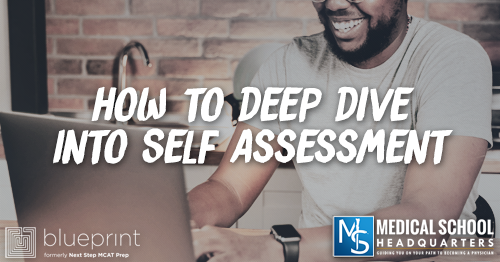Apple Podcasts | Google Podcasts
Session 252
This week, we chat with Blueprint MCAT instructor Ali about mistakes that YOU may make on the MCAT! We know that the MCAT is hard and the MCAT is important. But students continually make the same mistakes over and over again. So let’s break down how to prevent these common mistakes. If you would like to follow along on YouTube, go to premed.tv.
Listen to this podcast episode with the player above, or keep reading for the highlights and takeaway points.
[03:42] How Long Should You Study for the MCAT?
Studying for the MCAT for a couple of nights will not cut it, although with very rare exceptions. That being said, you need a lot of time to study for the MCAT. Especially if you study for the MCAT while you’re taking classes or doing research or working. and that means studying for four to six months.
The AAMC published some data saying that the average student studies the MCAT for 280 hours. If you divided that by six months, that’s 11 hours a week. The problem is the average MCAT student scores around 501 and the average score to get into medical school is 511. So you need to aim for a higher score than 501.
If you want to study for the MCAT full-time three to four months before your test date, Ali suggests spending 25-35 hours a week. And if it’s closer to six months, you can study full-time for 15-20 hours a week.
[06:40] Mistake #1: Not Taking Enough Practice Tests
Ali says you shouldn’t sit down and read the chapter of the book by chapter. Instead, do an untimed practice as a primary way to approach the material.
'You're not going to get better until you practice a ton and make a ton of mistakes and learn from these mistakes.'Click To TweetYou’re taking the practice tests to make mistakes and learn from them, and not because you want to get the validation that you got them.
One of the probable reasons a lot of students avoid practice tests is that they’re trying to protect their ego. They’re afraid that if they get wrong, it will hurt their ego. But that’s just going to delay the issue so you need to get that out of the way early on. Take a few practice exams and recognize that you have weaknesses you need to address.
Ali also mentions there’s this ego battle that students have with the MCAT. They want to get the hardest question right, instead of just skipping that hardest question and spending time on the easier ones to get more points. Your job is to get the points and not prove you can solve this hardest question.
[10:24] Mistake #2: Focusing Too Much on Content
The MCAT is not a content test. It’s a critical thinking and analysis test that just happens to be testing some science stuff that you should know. Ali says that the number of questions that will test you about the content directly the way it’s tested in undergraduate is very small.
Ali sees content as the canvas that the MCAT is drawing on. You need to know some backgrounds. This is the language of the test. But you need to apply it to passages and situations you’ve never seen before, and that requires a skill that you need to hone. And you can only do that by practicing and learning from your mistakes.
'Taking 100 questions is not enough. Learning from the 100 mistakes you make is what gives you the points on test day.'Click To Tweet[13:43] Mistakes Students Make in the CARS Section
Reading Without Reasoning
A lot of students think that they don’t need to review CARS since there’s no content there. CARS stands for Critical Analysis and Reasoning Skills.
'CARS is not a reading test. It's a reasoning test.'Click To TweetAs the name suggests, you want to be able to reason about the test and not just read and understand the test. The CARS section requires you to go deeper than just knowing how to read a test.
Cramming
'Learning CARS is a very long process that you cannot cram.'Click To TweetEven if you start studying for CARS six months before the test date, cramming CARS one day every few weeks will not yield good results. It’s a skill you need to nurture and nourish so you have to do it on a daily basis five or six days a week right from the very beginning.
It’s not about the quantity too. Ten passages on one day every ten days is not the same as taking one passage every day for 10 days. So you have to spread your course practice for it to work. That’s why you have to start early.
[15:45] Biggest Mistake with the Question Review
When you miss a question, it’s very easy to blame account content. You think you didn’t get the formula right so you study the formula. But that wasn’t the issue for you because you knew the formula, you just didn’t pick the right one.
With content issues, you can fix those with flashcards. If you have big concept issues, you can watch videos and do the books. Now, if you have reasoning issues, then you need to sit down and think about how to approach the questions. Hence, you need to reflect on why you missed the question then you can start addressing it.
Ali recommends reviewing right after an untimed practice. Your thought process is still fresh in your mind to so it’s easier for you to diagnose what went wrong with it.
[17:16] Timed vs. Untimed Tests
When you start with your prep, Ali suggests spending 100% of your practice on untimed practice. If every few weeks, you’re taking a full-length exam, and you want to take it under timed conditions, that’s fine.
For Q bank questions or any questions you have access to, Ali advises students to do them on time so they can follow up with what went wrong and how to fix it.
[18:31] Taking Full-Length Exams
Timing and Pacing
Ali advises not to cram the full-length exams at the end and do a month and a half or two months of content review at the beginning.
Instead, start pacing yourself. For instance, take the full-length exam every three or four weeks in the beginning. Then increase your frequency by the end of your prep and take one a week.
Content Review vs. Practice Tests
If you’re trying to decide between doing a content review or a practice test, then the latter should win. Again, the MCAT is not a content test. You do need to know the content but this is not the core of the MCAT.
[19:51] Stop Comparing Yourself with Others
Unfortunately, some students tie their self-worth into their MCAT score or their practice test score. Ali reminds students to recognize that the MCAT is not a test that you should be posting about on Reddit to prove that you’re better than other people.
'It's not a test of your self-worth.'Click To TweetYou may be taking your full-length exams or doing more questions. But if in the back of your head, you just are constantly reminded of these students talking about their good grades, this is only going to disrupt you continually so just stay away from those types of posts.
Your job is to get into medical school, and not to get 528 on the MCAT. You want to score high enough to get into medical school. So don’t lose sight of that.
[26:36] Be Flexible
A lot of students go into their real MCAT not prepared, but they take the MCAT anyway, hoping for a miracle. They have this arbitrary mindset of having to take it now so they can apply to medical school early or apply this cycle. They don’t want a delay so they’re taking the MCAT and this is a huge mistake.
“Take the MCAT when you’re ready.”Click To TweetThen there’s also this advice that you should register as soon as possible so that you have a seat locally. Then you don’t have to travel for the MCAT and stay at a hotel, which can complicate things.
Now, those are two conflicting pieces of advice because how do you register for a test when you don’t know if you’re going to be ready for that date?
Ali recommends that you project when you’re going to be ready, given the data that you have today.
For instance, if you’re starting to study for the MCAT for an April test. If you have the time to study between now and April, go ahead and register for an April test. It might be costly to change that test date later, but you would rather book it and not worry about it for now.
Now, if by February or March, you realize that you’re not on a trajectory to be ready for testing. Maybe you’re not scoring high enough. Then you need to change your test date. Seats might be scarce at that point, but that does not mean you’re not going to find any seats. The good news is that AAMC restored the deadlines to change your test dates at different costs.
Links:
SEARCH SITE
SEARCH SITE
LISTEN FOR FREE












